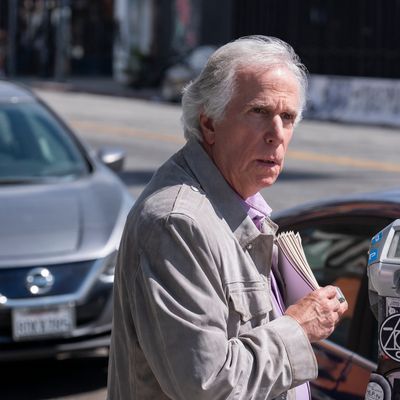
From the beginning, a central focus of Barry has been the human need to tell ourselves stories. When Barry moved to Los Angeles, acting became a way for him to look inward and make sense of the violent impulses he couldn’t understand. But by last season, our protagonist had distanced himself from Hollywood, too deeply ensconced in the crime world to use acting except as a misguided attempt to earn Gene Cousineau’s forgiveness. With her ambition to turn the trauma of her abusive marriage into art, Sally became our main window into the acting world — and the way she compromised her story to reach a wider audience made for a fascinating counterpoint to Barry’s continued denial about the man he was.
In season four, things are a bit different. While Barry is incarcerated and out of the acting game for good, Sally also finds herself with fewer options. When she meets with her ex-agent Lindsay, she gets a painful reality check: To most people who recognize her face, she’s either the “entitled c-word girl” from the viral video of her tantrum or the girlfriend of a serial killer. She could probably make a killing from a reality TV or a podcast, but being taken seriously as an artist? As Lindsay puts it, “You have two high-profile strikes against you, and on top of that, you have integrity.”
And it’s not even Sally’s first tough meeting of the day. Earlier, during her first visit to Barry in jail, she accuses him of lying, but he insists that he didn’t lie; he just didn’t tell her the part he didn’t want to be true. It’s a bullshit excuse, but the sentiment rings true for Sally, who has direct experience with papering over the messy, unflattering details of her own traumatic experiences. Maybe that recognition of herself unsettles her the most as she sits there, listening to something akin to an honest apology. Barry is genuinely grateful to her for making him feel like a person, and the sad truth is that Sally feels grateful for him, too, despite everything. “I feel safe with you,” she confesses, but the feral desperation with which Barry seizes on that comment drives her away.
It’s the type of relationship-defining conversation I expected to see in the series finale, not in the second episode. And it’s not the only time in “Bestest Place on the Earth” that Sally is faced with a mirror image of herself. Later, when she visits the old theater, she sees firsthand how Gene is handling all of this: by spilling his story to a Vanity Fair reporter, acting it out onstage like a one-man show.
It’s a fascinating idea to spend one season making someone an unlikely hero and then follow it up with a season that shows them buying into that idea too much. I spent much of this episode cringing as Gene backslid into self-aggrandizement, telling the origin story of how he took a chance on a desperate young veteran who turned on him “like an ungrateful tiger.” It feels particularly cynical when he retells the anecdote of arriving home to see Barry threatening his grandson’s life. There’s truth to the story of how Gene finally took down Barry, but he tells it like he was playing a deliberate long game by “pressing those buttons” rather than simply appeasing Barry with affection out of pure fear.
Gene repurposing a horrifying, vulnerable story into a hero narrative directly connects to Sally, who did the same with Joplin (and the acting showcase from season two). Then again, I wouldn’t be surprised if Sally doesn’t recognize the parallel herself. She has always had a gift for ignoring what’s in front of her, as Gene gently alludes to after she confronts him.
I never really considered how Gene kept Sally in danger last season by not warning her about Barry, but she has the right to be angry. But then this scene takes an unexpected turn away from bitterness and animosity, and you remember the history between these two characters, bonded by their love of performance. Gene offers some solace by acknowledging that as actors, both of them were susceptible to Barry’s adoration. Maybe he and Sally really are two sides of the same coin — and both have more in common with Barry than they might like to admit.
Even Hank relates to Barry now more than he ever did before, finally becoming a killer himself. In “Bestest Place on the Earth,” he and Cristobal put together a team for their new sand operation, made up of Guatemalans and a rival mob led by an old associate (François Chau). Their rousing speech about squashing beef to combine talents occurs at a Dave & Buster’s, captured in one dizzying shot trading off clockwise and counterclockwise pans around the table to follow whichever man is speaking. It’s the latest nifty visual embellishment from director Bill Hader.
But while everyone is receptive to the pitch — setting up a nationwide sand operation that will grow into a legitimate enterprise — Hank also unexpectedly announces another plan: to break Barry out of jail using the services of a man named Toro. It embarrasses Cristobal, who later asks why Hank is so determined to help Barry out, even suggesting this is why people think Hank is soft. “Barry doesn’t care about you,” he insists.
Later in that scene, Hank gets a call and realizes the truth of Cristobal’s words: According to Fuches, Barry made a deal with the FBI, promising to tell them everything. “We have to kill Barry,” he says flatly.
Barry accepting a deal from the FBI doesn’t just spell doom for Hank; to Fuches, it’s the latest example of his ungrateful son-figure turning his back on their relationship. We see two flashbacks in this episode to the origin of their bond, back when Barry was a kid and Fuches was just a family friend. During those looks back, Barry is considering where the two of them stand, and whether he’d be willing to turn on Fuches again given the opportunity for a better life. That’s most clearly depicted with the second fantasy that plays out before Barry’s eyes, after he hears about the deal Fuches would have gotten. It’s another dazzling scene: a friendly exchange projected before him in an imaginary desert, interrupted by a dreamlike wedding party dancing into a banquet hall where an older Barry and Sally dance, peaceful and in love.
In the end, it’s a fantasy that’s impossible for someone like Barry to resist. So he flakes on the meeting with the “beast” lawyer (Matt Servitto) Fuches mentioned, running to the FBI to offer up the various international L.A.-based crime syndicates he worked with. The betrayal actually hurts Fuches, who made a surprisingly significant sacrifice by throwing the wire away when he saw Barry beaten and bloodied on the restroom floor.
Barry should know by now that his efforts to escape the consequences of his actions will never really succeed. Even if he does manage to evade whatever killers Hank sends to put him down, he’ll still have to go on living with himself. If his best-case scenario is entering witness protection and taking Sally with him, it still involves fucking over a lot of people who cared about him and robbing a woman of even more of the life he already stole from her. That’s not to blame Sally’s downturn on Barry entirely, of course; she did this to herself, just like him. Maybe the biggest question, as this final season progresses, will be this: Will anyone in Barry successfully leave behind the worst version of themselves?
Bullet Points
• Lots of funny moments at Dave & Buster’s, especially whenever the employees interrupt an ostensibly serious mob meeting. The waitress asking about appetizers is timed perfectly, but “We’ve got this room for, like, another hour, please” is another highlight.
• I also very much enjoyed Fuches interrupting his fellow inmates’ Yellowstone time to offer them a piece of the action, giving them some nonsensical nicknames. Fuches, the least you could do is let them read my Yellowstone recaps.
• Also, the cut to Barry telling Fuches, “That speech was really good,” is probably the first opportunity Hader has gotten to be funny in front of the camera this season.


